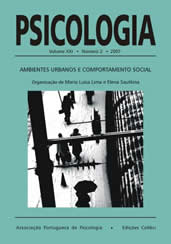Environmental and Psychosocial Factors of Pick-pocketing Risk Evaluation: The Case of Two Sites in Lisbon
DOI:
https://doi.org/10.17575/rpsicol.v21i2.368Keywords:
-Abstract
It is in common knowledge that pick-pocketing is a type of crime encountered in urban environments. Based on previously identified environmental and psychosocial factor of spatial representations of security/insecurity, the current research aimed at exploring environmental factos that could affect people’s evaluations, as regards the risk of being pick-pocketed. With this purpose, two sites in Lisbon differing mainly in their physical and social environmental features were cnsidered. Results show that strong social bonds within a place may appear very importante for evaluation of pick-pocketing risk, putting aside and making less importante physical layout, whereas in socially heterogeneous places, where social bonds are weaker, physical environment becomes consequently more important for perceptions of safety.


